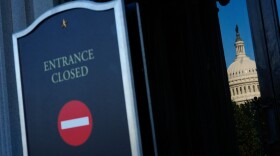-
Native tribes across Utah are not feeling immediate impacts from the government shutdown, but state agencies and nonprofits are on standby.
-
The U.S. Department of Agriculture plans to move thousands of employees out of Washington, D.C., aiming to save money and bring them closer to farmers and ranchers. Around 2,600 workers will relocate to five hubs from North Carolina to Utah.
-
Overall, the voters KUER and PBS Utah spoke to are pleased with where the country is headed. There were, however, a few worries about the economy and the rule of law in Trump’s second term.
-
More than 320,000 people in Utah have federal student loans. On May 5, the U.S. Department of Education will start collecting loans from defaulters and is expected to garnish wages this summer.
-
Some Utahns have filed for unemployment while looking for new roles outside of the government. Others are cutting back spending to prepare for being laid off.
-
This year, Salt Lake City will determine where to allocate nearly $4.9 million in federal dollars for housing and human services. The city is mindful the situation could change at any time.
-
The Monticello FSA office lease termination is listed on the DOGE website, but if and when it will happen is unclear. Rural farmers rely on in-person services at the office for loans, grants and other programs.
-
Ripple effects of the Trump administration's crackdown on U.S. medical research promise to reach every corner of America. Delays in funding from the National Institutes of Health and massive planned cuts to that money, if they survive a court fight, would cost jobs.
-
The federal government is the largest employer in Weber and Davis counties. Leaders worry mass layoffs could hurt the local economy.
-
The list, published by the General Services Administration on Tuesday, was revised once and, a day later, deleted from the GSA website. Three buildings in Utah had been listed.
-
The order halted funding that local nonprofits relied on to help new refugees settle in Utah.
-
Legal and historical experts say Utah will have to overcome centuries of precedent if the state is to be successful in claiming 18.5 million acres of land controlled by the federal government.
Play Live Radio
Next Up:
0:00
0:00
Available On Air Stations












